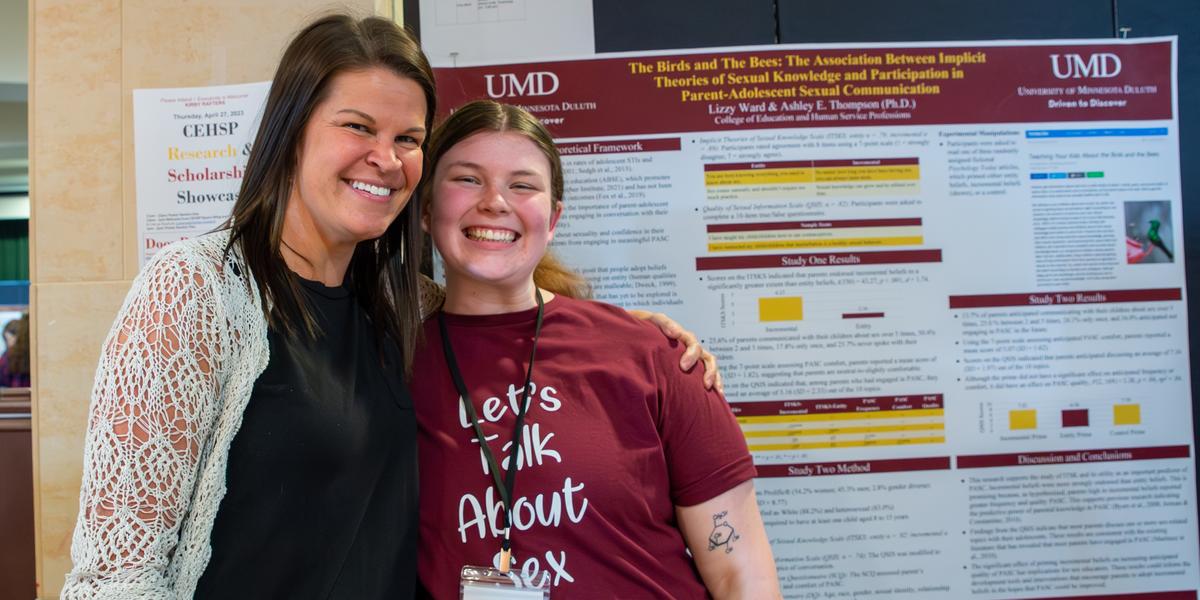When Lizzy Bensen was in high school, a number of their peers were diagnosed with sexually transmitted infections (STIs). This diagnosis led to being shamed and stigmatized by family, friends and even healthcare providers.
Bensen, who is double majoring in Public Health and Women, Gender, and Sexuality Studies at UMD, believes that shame and stigma have absolutely no place in healthcare. That is why they’re interested in pursuing a doctorate in public health. Bensen would like to work in sex education and related interventions after college to help prevent adolescents from experiencing shame and stigma around their sexual experiences.
Bensen was awarded an Undergraduate Research Opportunities Program (UROP) grant to study the application of implicit theories of sexual knowledge. They were mentored by Professor Ashley Thompson from the UMD Department of Psychology for the project.
Specifically, the research looked into whether or not people endorsed two beliefs they presented about sexuality. The first idea is that we are born inherently knowing all we need to know about sex and how to engage in it. The second idea is that we do not inherently know, and that is why it is important to explore sex, seek out information to learn about it, and then put the information into practice.
The research was geared toward parents with children between the ages of 8 and 15 and was conducted via online surveys. Bensen and Thompson’s larger research goal was learning how a tendency toward one belief or the other influenced the communication styles parents had with their children about sex. The results indicated that parents endorsed both of these beliefs.
But they found that parents who were part of the group who thought sex needs to be explored to gain more knowledge had higher quality and more frequent communication with their children.
One exciting aspect of the research was that this was a brand new application of implicit theory—the idea that mindsets are either fixed or growth-based. This theory has been applied to many different areas of research, now including Bensen’s project on sexual knowledge. Bensen expressed surprise at how the evidence correlated so strongly. “Holy cow, this worked!” Due to the strength of their research findings, they have been submitted to the American Journal of Education.
Quality research contributions
Bensen is an active member of Thompson’s research team in the UMD Sexuality and Relationship Science Lab. Thompson says Bensen has been an “integral force” in “research assessing fixed and growth beliefs related to sex and the impact of these beliefs on parent-adolescent sexual communication.”
According to Thompson, Bensen has made many significant contributions to this research program, including taking the lead in preparing an article that is being reviewed for publication. The high quality of this work has led to several speaking opportunities. Thompson will be presenting their research on the application of implicit theories of sexual knowledge at the World Association for Sexual Health in Turkey, while Bensen is presenting an offshoot of these findings at a national conference in New Orleans this fall.
Bensen and Thompson are already getting started on their next research project, which will look at the stigma sex workers experience from law enforcement and healthcare providers. This idea is based on the thesis from one of Thompson’s previous graduate students. Graduate student Madeleine Hill will also assist with the project. Bensen found the topic and information fascinating and is now reviewing related literature to prepare for future papers and presentations on the topic.
Mentoring has been key to Bensen’s success, particularly early on when they doubted their abilities. “Working with Dr. Thompson has been an incredible experience. She was my biggest cheerleader,” Bensen says.
“It has truly been a pleasure working with Lizzy. I wholeheartedly believe that the manuscript they spearheaded was completed sooner and at a higher quality than what I would have produced on my own,” says Thompson. “I am honored to be able to support their research in any way that I can. Lizzy's future is bright!”
The University of Minnesota’s Undergraduate Research Opportunities Program (UROP) provides students with a stipend to conduct research in an area of interest to them, under the supervision and guidance of a faculty member. Learn about the UROP program.
The feature photo of Associate Professor Ashley Thompson and Lizzy Bensen was taken by Associate Professor Ladona Tornabene. This story was written by UMD public health student Marissa Thompson, with assistance from Lissa Maki, communications specialist for the College of Education and Human Service Professions.
